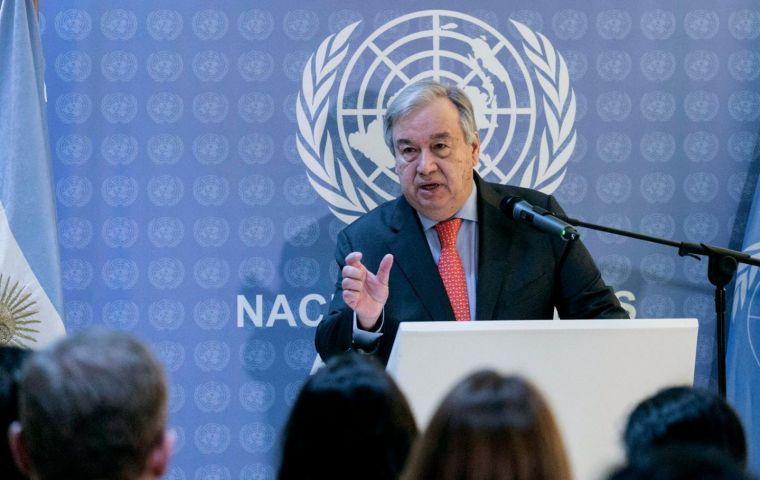MercoPress. South Atlantic News Agency
Renew political commitment at the South-South Cooperation summit in Buenos Aires
 Guterres believes that the ambitious and transformational 2030 Agenda for Sustainable Development can not be achieved without the ideas, energy and tremendous ingenuity of the countries of the South
Guterres believes that the ambitious and transformational 2030 Agenda for Sustainable Development can not be achieved without the ideas, energy and tremendous ingenuity of the countries of the South The member states of the South-South Cooperation Plan will meet in Buenos Aires from March 20 to 23 to launch a new strategy with a view to implementing the UN Sustainable Development Agenda 2030 within the framework of the Second High-Level Conference of United Nations on South-South Cooperation, PABA +40. The event will commemorate the 40th anniversary of the approval of the Buenos Aires Action Plan and awaits a “renewed political commitment” from participating States.
South-South Cooperation refers to technical cooperation among developing countries, which are mostly located in the South of the planet. It is a tool used by States, international organizations, civil society and the private sector to collaborate and share knowledge, skills and successful initiatives in specific areas such as agriculture, human rights, urbanization, health, climate change etc.
The central theme of the discussion will be how South-South cooperation represents an opportunity to achieve the 2030 Agenda for Sustainable Development, which seeks, among other objectives, to end hunger, poverty and counteract climate change.
The Secretary General of the UN, Antonio Guterres, will attend the opening of the conference that will host Argentina’s capital.
What is now known as South-South Cooperation, derives from the approval in Argentina, on September 18, 1978, of the Buenos Aires Action Plan to Promote and Carry out Technical Cooperation among Developing Countries (PABA).
At that time, Plan was signed by 138 States and created a bridge of collaboration among the least developed countries.
Guterres believes that the ambitious and transformational 2030 Agenda for Sustainable Development can not be achieved without the ideas, energy and tremendous ingenuity of the countries of the South.
“Innovative forms of knowledge sharing, technology transfer, emergency response and recovery of livelihoods led by the South are transforming lives,” the Secretary General said in November 2018.
Along with political dialogue, economic cooperation and financial cooperation, South-South cooperation has shaped a large number of exchanges through programs, projects and initiatives that have helped to solve specific challenges of the countries of the South.
PABA +40, provides a unique opportunity to review the lessons learned from the last decades, identify new areas and mechanisms where South-South cooperation can add value and have a greater impact, and commit to build an adequate and systematic follow-up in the framework of the United Nations system.




Top Comments
Disclaimer & comment rulesCommenting for this story is now closed.
If you have a Facebook account, become a fan and comment on our Facebook Page!